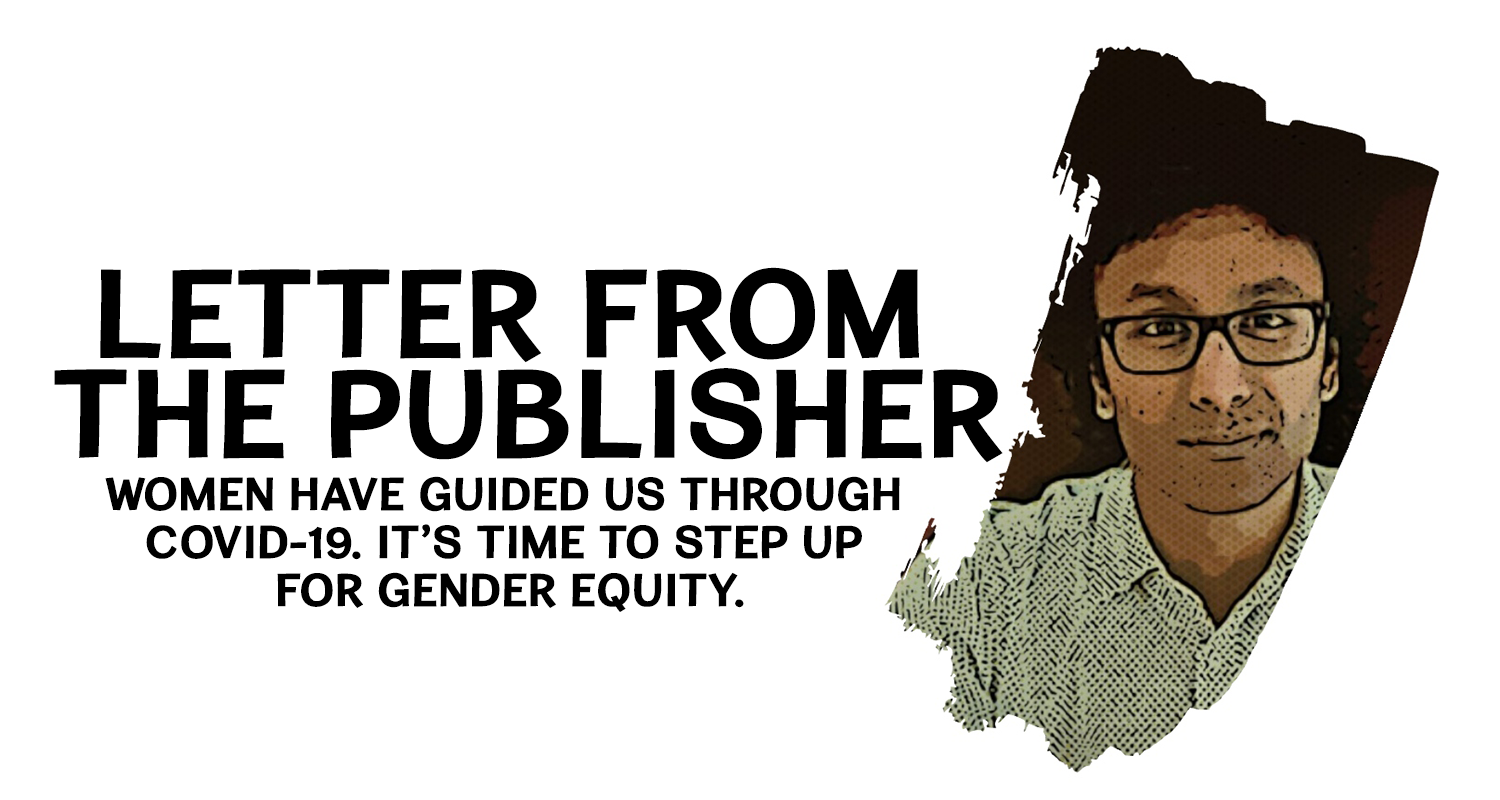Women have guided us through COVID-19. It’s time to step up for gender equity.

Happy International Women’s Day, and Happy Birthday to my daughter, Simi.
Since my daughter was born on March 8th six years ago, her birthday celebration has incorporated acts of honouring the power of women and girls. The day is also a time to remind ourselves how far we still need to go.
This past year has seen breakthrough and advancement of women’s leadership in fighting the pandemic — at the highest levels with Dr. Theresa Tam guiding Canadians through the pandemic to the thousands of women on the frontlines keeping us safe. According to Policy Options, of the 14 provincial and national chief medical officers and public health officers, 7 are women. There are also women in public health officer roles in large cities such as Toronto and Ottawa. (Side note: Simi is super proud that Dr. Vera Etches is Ottawa’s Medical Officer of Health and her mum also works at Ottawa Public Health. “Women are saving us from COVID,” she often runs around the house saying.)
We also saw the first woman finance minister in Canada, Chrystia Freeland, and in the U.S., Kamala Harris, the first woman, first Black person and first Asian person elected as vice-president. Entrepreneur Whitney Wolfe Herd, 31, founder of Bumble, became the youngest female CEO to take a company public. On the global stage, Nigeria’s Ngozi Okonjo-Iweala became the first woman and first African to lead the World Trade Organization. In June 2020, Canada was recognized by CARE as having the most gender-responsive plan to address COVID-19. Rightly so, for 2021, Canada’s theme for International Women’s Day is #FeministRecovery. This week, the Canadian government is hosting Canada’s Feminist Response and Recovery Summit convening elected officials and feminist leaders and those with lived experience to examine how COVID-19 is impacting the lives of women across the country.
Meanwhile, though, women in Canada’s workforce felt some of the most severe economic disruptions from COVID-19. The pandemic pushed women’s participation in Canada’s labour force down to its lowest level in three decades, with 1.5 million women losing their jobs in the first two months of the pandemic. Beyond the strain these job losses have placed on women – who have borne the brunt of child care responsibilities as daycares and schools close and open – their impact on Canada’s overall economic activity has been severe. According to RBC Economics, the outsized role women play in the industries hardest hit by this economic downturn together with ongoing uncertainties about availability of school and childcare in the spring mean this lost ground won’t easily be recovered.
COVID-19 has become one of the most serious public health, social and economic crises Canada has faced. It has revealed fundamental gaps in our society and disproportionately impacted those who were already marginalized, vulnerable or struggling. The three industries with the highest ratio of women to men in Canada are: health care and social assistance, educational services, and accommodation and food services. And the most precarious jobs in these fields are usually filled by racialized, Black, and migrant women. Women represent the majority of essential workers on the front lines of the fight against COVID. However, over the past year, gender-based violence grew as girls and women were confined to their homes. To reimagine post-pandemic rebuilding, organizations such as the Canadian Women’s Foundation, Oxfam Canada, YWCA, and many others are fighting for a feminist approach to economic recovery. Last year, YWCA Canada and the Institute for Gender and the Economy produced Canada’s first-ever feminist plan for our country’s economic recovery from COVID-19. There is still a long way to go.
At Future of Good, feminist response and recovery is an important part of our social impact coverage. In just the two short years we’ve been around, we’ve featured stories of and insights from women whose bold ambitions and brave journeys are shaping and inspiring a better tomorrow for all. We are proud that 70 percent of our member community are women. 70 percent of all Future of Good’s speakers at our webinars and summits last year were women. Women make up 80 percent of our core team. However, we still have a ways to go. So far, only 61 percent of the overall readership on our website are women. Only 42 percent of our stories were written by women or gender non-binary people over the last year. We believe in the power of stories to move us forward and we are working to balance this number.
This International Women’s Day, and over the course of March, we’re publishing a special series of powerful and insightful stories featuring women shaping the future. I’ll be sharing some of these with Simi at storytime this month.
First up — coming tomorrow is a set of profiles of women shaping the future by breaking through glass ceilings at social impact organizations by becoming the first-ever woman to head up an organization which was always run by men. It’s women like Karlee Silver and Jocelyn Mackie, Co-CEOs of Grand Challenges Canada, Grace Lee Reynolds, CEO of Artscape, and Priyanka Lloyd, Executive Director of Green Economy Canada. They have so much to teach us all about grit, persistence, audacity, and the power of staying true to yourself.
Throughout our special series this month, you’ll find women who are rewriting the stories we’ve been told about ourselves, our sector and our society. Get ready for diving into brave journeys, radical ideas, laughter, reflection, and be prepared to unlearn some things.
Vinod Rajasekaran
Publisher & CEO
